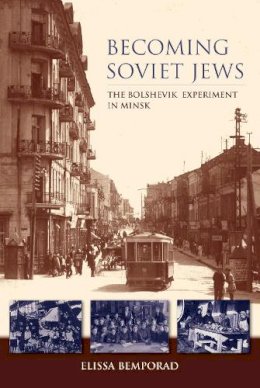
Becoming Soviet Jews: The Bolshevik Experiment in Minsk
Elissa Bemporad
Minsk, the present capital of Belarus, was a heavily Jewish city in the decades between the world wars. Recasting our understanding of Soviet Jewish history, Becoming Soviet Jews demonstrates that the often violent social changes enforced by the communist project did not destroy continuities with prerevolutionary forms of Jewish life in Minsk. Using Minsk as a case study of the Sovietization of Jews in the former Pale of Settlement, Elissa Bemporad reveals the ways in which many Jews acculturated to Soviet society in the 1920s and 1930s while remaining committed to older patterns of Jewish identity, such as Yiddish culture and education, attachment to the traditions of the Jewish workers' Bund, circumcision, and kosher slaughter. This pioneering study also illuminates the reshaping of gender relations on the Jewish street and explores Jewish everyday life and identity during the years of the Great Terror.
Product Details
About Elissa Bemporad
Reviews for Becoming Soviet Jews: The Bolshevik Experiment in Minsk
Choice
[T]his is an excellent book, offering a fascinating case study of how a Soviet-Jewish identity in a particular Soviet city came into being.
The NEP Era: Soviet Russia 1921-1928
[A] book that is highly readable and brimming with novel facts and insights . . . Becoming Soviet Jews is a rich and engaging portrayal of a previously overlooked period and place.
H-Judaic
Becoming Soviet Jews opens a window into the almost entirely forgotten wealth of Soviet Yiddish life. . . . Bemporad's detailed focus on the city of Minsk gives a much deeper sense of what communism and Yiddish culture meant in the 1920s to thousands of individual Jews, in all the diversity of their politics, beliefs, gender, and class backgrounds.
New Politics
This thoroughly researched study illustrates the tenacity of Jewish identity in the face of significant repression.
The Russian Review
This book is built on a rich source base of archival materials. . . . Bemporad does not simply rehearse archival material for its own sake. Rather, she brings a wealth of sources to support each of her arguments. . . . There is a lot that is new in Bemporad's study. Most important, the focus on daily experience complements other approaches and offers a fuller understanding of Jewish Minsk during the first two decades of Soviet rule.
Jewish History
The acculturation of Western European Jewry that occurred in the nineteenth century (i.e., Jews in their outward appearance came to be more or less indistinguishable from their compatriots, spoke the local languages, and made contributions to local cultures) was telescoped in the newly established Soviet Union. How this rapid transformation took place in one city, Minsk, is the subject of Elissa Bemporad's fine book.
American Historical Review
With this history of Jewish Minsk, the distinguished roster of books on Soviet Jewry has acquired a new and endlessly rewarding addition. Elissa Bemporad's focus on this single, once largely Jewish, city gives us both the local picture and the larger one. . . . the details are fascinating, and the author's analysis is nuanced and respectful of human limitations.
Slavic Review
[An] excellent, deeply-researched book . . . . [A]n exemplary work of scholarship.
SheldonKirshner.com
This book is one of the most accessible of a number of recent studies that both analyze and describe [the transformation of Jewish life in the USSR]. . . . Although technically the focus of this book is on social history, it is also an important contribution to the history of Jewish religion in the USSR.
Religious Studies Review
Elissa Bemporad's Becoming Soviet Jews presents a fascinating account of the ways in which Minsk Jews continued to observe Jewish traditions and maintain their Jewish identity, during the 1920s and early 1930s, despite Soviet pressures on Jews to assimilate. On the basis of extensive research in Belarusian historical archives, Yiddish and Russian newspapers, memoirs in Yiddish, Russian, and Hebrew, and other sources, Bemporad shows that despite the Soviet attack on synagogues and on Jewish political organizations . . . Jewish culture and identity survived and even, in some respects, thrived, during this period.
Canadian Slavonic Papers
Bemporad has written an exemplary book in terms of its research, analysis, and argumentation. Becoming Soviet Jews should be essential reading for anyone interested in the transformation of Jewish society under Lenin and Stalin and how Jewish identity became uprooted from its religious foundations yet managed to endure in the 1920s and 1930s.
Journal of Modern History
[This is] a clearly written, well-researched and impressive study that enriches our understanding of Soviet Jewish life before the Second World War.
Revolutionary Russia
By bringing together local factors as well as the Soviet and international contexts, Bemporad opens new ways of looking at Soviet Jewish history and reveals not only the uniqueness of the Minsk context but also the personal and collective strategies adopted by Jews to accommodate their religious, ethnic, social, and economic identities to the new context.
Ab Imperio
[Significantly advances] the scholarly understanding of the history of Soviet Jews. [Makes] a valuable contribution to the recent historiography that attempts to construct a balanced picture of the cultural, ethnic, and professional profile of Soviet Jewry.
Kritika : Explorations Russian & Eurasian History
Using Minsk as a case study of the Sovietization of Jews in the former Pale of Settlement, Elissa Bemporad reveals the ways in which many Jews acculturated to Soviet society in the 1920s and 1930s while remaining committed to older patterns of Jewish identity, such as Yiddish culture and education . . . .
Jewish Book Council
